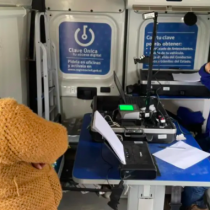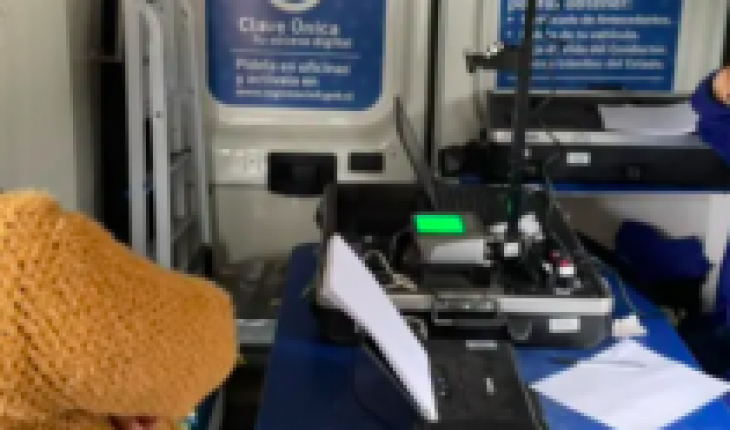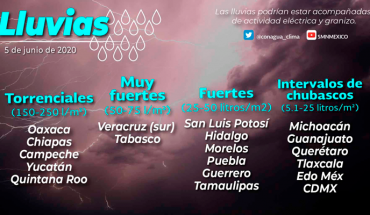
“It seems that all these modifications and changes are like remote controlled for the company Aisino Corporation whatever the bid is awarded,” deputy Jaime Naranjo (PS) said on Tuesday, August 9, in the Chamber’s Economy Committee, in the middle of the session that he himself had called to ask the director of the Civil Registry for explanations for the millionaire tender in progress within the service.
At the meeting, the director(s) of the Civil Registry, Sergio Mierzejewski, was insecure, hesitant. Faced with questions about why the terms of the tender were modified to exclude bidders from submitting physical documents, which could be reviewed for quality, the director excused himself by pointing out that it was due to pandemic reasons, causing uncertainty among the members of the commission, since the health emergency did not stop the sending of documents and, also, because that requirement was replaced by that of previous experience. Something that Naranjo described as suspicious.
A similar situation was observed when Mierzejewski was consulted about the reasons, particularly in this tender, why price was more important than quality, assigning 65% to the economic evaluation and only 30% to the technical evaluation, in circumstances where what is sought are documents of a high standard of security. The director’s response was that it was weighed that way because “the quality was already assured.”
After two hours of an uncomfortable session, Deputy Naranjo managed to get it approved to officiate to the Comptroller’s Office to study “as a matter of urgency” the bases of the tender, agreeing that the responses of the director of the Civil Registry were not satisfactory.
This session only increased doubts about a process in which the Chinese tech giant Aisino has been filling itself with shadows, several of which have sought to dispel themselves after the informal efforts of lobbyists and managers of interest who, since 2019, have held meetings with Chilean authorities on behalf of the Chinese company, and not only referred to the Civil Registry. His interests are also in the areas of security, customs, agriculture and prison affairs, among others.
Bernardo Caro, the “Juan Díaz” of Aisino
The presentation of the tech giant in Chile came days after the social outburst of October 2019, when Ma Zhenzhou, vice president of Aisino Corporation, began to be presented to Chilean authorities by the lobbying agency KOM, Soluciones estratégicas, headed by Eugenio Ravinet – former executive secretary of the political committee of the presidential campaign of Ricardo Lagos – and Freddy Ponce – former electoral administrator of former Senator Fulvio Rossi, during the 2009 campaign–.
In a range of 6 months, the senior Chinese executive recorded 17 meetings, which were recorded on the Info Lobby portal. Some of these were with the then Minister of Agriculture, José Antonio Walker; with the national director of gendarmerie, Christian Alveal; with the director of the Internal Revenue Service, Fernando Barraza; and the deputy director of Customs Informatics, Jorge Mellado.
But even before these meetings with Ma Zhenzhou, Ravinet’s agency had already been accompanying Chinese delegations to meet with Chilean authorities. Among these was a tour he made with Xin Jao, general representative for Latin America of the Public Security Research Institute (IPSR) of Tsinghua University. The political purpose was to advance the establishment of a Cooperation Agreement with Onemi, on an Integrated Early Warning and Emergency Management Platform.
Together with the Chinese delegations and KOM partners, these interest managers were accompanied in most of these meetings by a person from outside the business of information technology and the digital world. This is Bernardo Caro Muñoz, a fishing technician who, for several years, was an advisor to the company Lota Protein, to “bring” artisanal fishermen to Congress when the Norwegian-owned company was in conflict with Chilean industrial fishing, within the framework of the discussion of the Longueira Law.
Caro is described as a kind of “Juan Diaz,” the former UDI political operative who was convicted of repeated bribery and tax crimes in the Caval case.
With an enterr and sociable personality, Caro expanded his relationships from fishermen’s unions tol Congress, where he was subsequently embroiled in an episode with clear tinges of political silver.
In the context of the payments, through ideologically false invoices and ballots, that some fishing companies made to politicians, one of the loudest controversies was the one that affected Caro. Between July 2011 and December 31, 2013, Bernardo Caro Muñoz, an “ad honorem” adviser to then-Senator Antonio Horvath, received a total of $274 million, which the company later justified as “consultancies” actually carried out.
At that time he earned $6,000,000 a month and, in light of an investigation by Ciper, it was found that “he operated within the same Congress, had an office of ‘Corporate Affairs’ within the same Congress of Chile, attended by Bernardo Caro. Its mission, to facilitate the work of ‘artisanal’ façade organizations.”
Today, he traded fishing for technology, and the Norwegians for the Chinese.
The soldiers of Idemia
Aisino is also the subject of the lawsuits filed on August 4 against the Civil Registry before the Public Procurement Court.
One of them is the one presented on behalf of Idemia, the French consortium that today administers the contract and wants to award it again. The legal action, in a nutshell, challenges the admissibility of Aisino’s offer. According to the brief, the Chinese firm would not satisfactorily comply with the requirements of biometric technologies required in the bases.
A situation that, internationally, had precedents when, in July 2020, the U.S. Federal Investigation Agency (FBI) issued a cybersecurity alert, indicating that the tax payment software that the government of the Asian giant forces foreign companies in China to use, had a malware (malicious software) that made it vulnerable to obtain private or reserved information.
The lawsuit was filed by lawyer Jorge Burgos Varela, former interior minister of Bachelet 2 at the time of “realism without renunciation” and one of the DCs identified with the most concertaist current of that party, known as “the princes.” In April, Burgos accompanied the filing of a lawsuit to challenge the tender, on the grounds that the bases were modified in such a way that it is not mandatory for the offering firms to submit samples of the cards or passports.
The legal action was rejected. The court accepted the arguments of the State Defense Council (CDE) to maintain the tender.
In this chapter of the legal strategy, Burgos – representing Idemia – was accompanied by lawyer Francisco Zúñiga, an expert in administrative law, close to the Socialist Party and head of the team of constitutionalists who collaborated in the program for the second government of Michelle Bachelet, from where the shipwrecked citizens’ councils left.
The duo is repeated on this occasion, where the arguments focus on Aisino’s technical inadmissibility. The complaint takes up an argument that was also mentioned by Deputy Giorgio Jackson. The RD parliamentarian states that, as for the “biometric algorithm tests”, they require a compliance of 99.5% and Aisino – according to Jackson – would only comply with 94%.
The DC is no stranger to the Civil Registry. Several militants close to “alvearismo” – by Soledad Alvear, who left the party – occupied positions in the distribution and some of them, such as former Vice President Enzo Pistacchio, who died last year, were involved in the irregularities of the tender similar to the current one, during the first Bachelet government, and that ended with the departure of the then director of the Civil Registry, Guillermo Arenas, PPD militant.
In August 2015, when the cost of the passport rose from $48 thousand to $89 thousand, the Minister of Justice, on whom the service depends, was Javiera Blanco, a DC militant and former head of the Citizen Peace Foundation when this was the punitive arm of El Mercurio. That year Idemia was already in charge of the contract, so, within the distribution, at first glance it was inexplicable how this company, which maintains the current rate at $ 89,660 for the travel document, can offer the passport at $ 19,527 for the current tender. Even at a cheaper cost than Aisino’s, those who offer it at $27,740.
The Arm of Probe
Sonda, which submitted the third-best offer, for a total of $261 million – behind Idemia, with $254 million, and Aisino, for $222 million – also has a “political arm.” Juan Bennett was a partner of Sonda, former director of the Sence in the government of Piñera 1 and, during the last months, frequent visit in the office of the director Sergio Mierzejewski. Within the institution they identify him as the one who, at the end of last year, recommendedor the hiring of the consulting firm IT-Trebol that audited Idemia. The investigation ended with a fine of $164 million for the French firm, which currently has the contract and is pursuing legal remedies to avoid paying the penalty, which they consider unfair, for an alleged breach of contract.
Another of the interest managers who has made efforts on behalf of Sonda – according to those who know the process – is former deputy Joaquin Godoy, a Piñerista who has historically been linked to the RN.
From the Civil Registry they assure that “the pieces were arranged to face the tender, the director who was surrogate, was chosen by Senior Public Management, but it was already clear that he was going to win,” says an official inside the institution.
Among these adjustments is the presence of Gonzalo Torres Ferrari, chief of staff of the director of the service, who has been the real pirouette to collect the concerns of the companies and move forward with the complex tender. Torres, who is hired at a fee of $5,029,000 gross per month, is an RN militant close to Mario Desbordes. Torres is the brother of Marcelo Torres Ferrari, a former mayor of Maipú, linked to the Basura case, as an official of the Municipality of Cerro Navia.
“The fight was very limited to Idemia and Sonda until, surprisingly, the Chinese broke in and, given the commercial relationship with China, the government is not bothered that they win,” says a version of a person close to the general directorate of the Civil Registry, although another version recalls the ties of Andrés Navarro – Sonda’s controller – with President Piñera, as well as the strategic presence of Juan Bennett, former company’s employer, among those who closely follow the bidding process.





